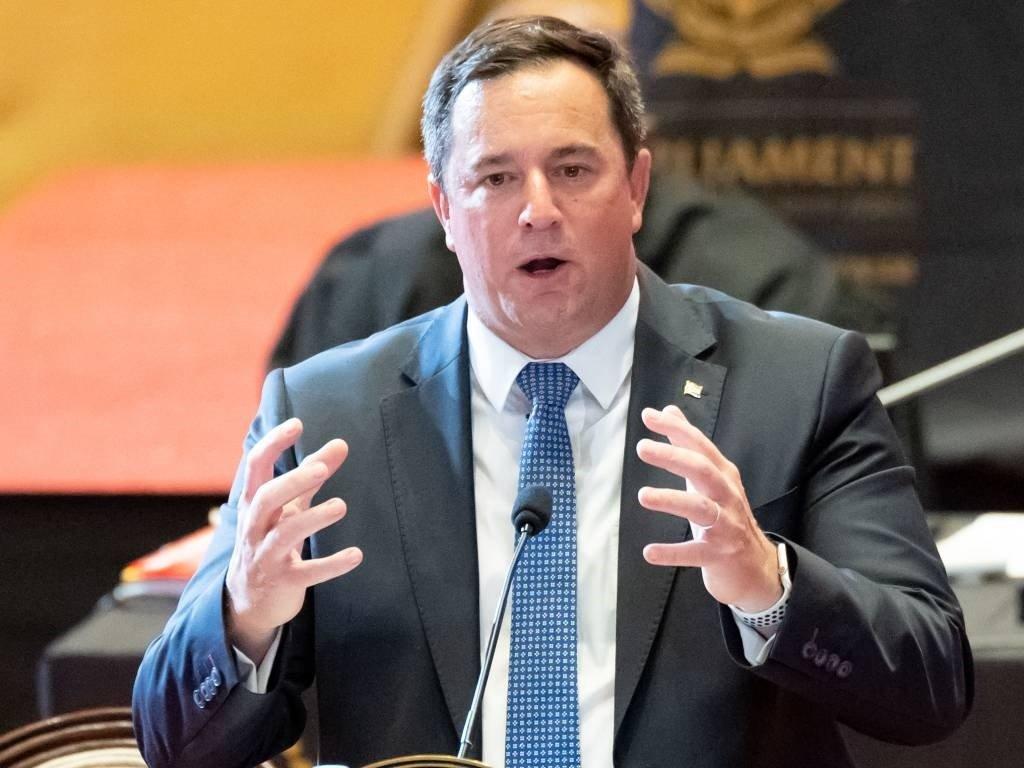Africa-Press – South-Africa. It is “deeply disturbing” President Cyril Ramaphosa met with Chief Justice Raymond Zondo to discuss the release of the final installment of the State Capture Commission’s report, says DA leader John Steenhuisen.
As the news broke that the much-awaited report’s release, scheduled for Monday evening, would yet again be delayed, the DA was about to screen its “documentary” on how cadre deployment aided state capture.
Speaking after the screening, Steenhuisen said he did not understand why the report was delayed.
“There were extensive extensions given to the Zondo Commission to produce these reports, and I think South Africa and the opposition have been very patient with that. But it now emerges there was an opportunity where the president and Judge Zondo met to discuss the timing of the release of this report.”
According to Steenhuisen this was “completely inappropriate”.
“Because we all know that Mr Ramaphosa himself appeared before the Zondo Commission, that Mr Ramaphosa himself could well be implicated in this final report. And, therefore, it is wholly inappropriate and deeply unethical, for somebody who is the subject of the report, whose party is the subject of the report, to be meeting with the judge, to discuss the timing of the release of the report.”
He said Ramaphosa and Zondo needed to take the country into their confidence and explain the reasons for the meeting and why the report was delayed.
He said he hoped the report was released sooner rather than later, adding he was frustrated by the delayed release of the report, as the work to root out state capture needed to start immediately.
“If we miss this opportunity now to firewall our institutions to give Parliament back its teeth, to end cadre deployment, we are going to be sitting in 10 years’ time, potentially with another cadre deployment scandal, except this time the faction will be from a different side of whoever the party is in government.”
Steenhuisen added because the commission was a judicial commission appointed by the president – it was former president Jacob Zuma who appointed it in February 2018 – it was the Presidency that must receive the report.
Zondo Commission: The 10 things Ramaphosa claims he didn’t know about
“But if I was President Ramaphosa, I would have maybe got the [director-general] to accept the report or to manage the handovers.”
He added Ramaphosa meeting Zondo to discuss the release of the report was akin to a judge meeting an accused to ask when it would be a convenient time to pass sentence on him.
At the heart of state capture was a blurring of the lines between the various functions, Steenhuisen said.
“There need to be very strict lines between areas of responsibility and accountability, and particularly if the president is himself mentioned in those reports, I think he should have at least maintained some semblance of arms-length away from that.”
Ramaphosa’s spokesperson, Vincent Magwenya, confirmed the president and Zondo discussed “the timing of the handing over of the final commission report” on Monday morning.
A media release from commission secretary Itumeleng Mosala did not shed much light on why the report’s release was delayed.
“The commission would like to inform the public that due to challenges in processing Part V and VI of the report on time for the handover to the president by 18:00 today, 20th June 2022, it has been agreed to move the event to Wednesday, 22 June 2022 the original handover date in Cape Town. The Presidency will announce the exact time for a Wednesday handover,” read Mosala’s statement.
“The final volumes of the Part V and VI of the report are about 1 824 pages long. The volumes themselves are seven in total. In the interest of quality and reduction of unavoidable errors and as a result of calendar logistical problems, it has become necessary to allow for a responsible and proper completion of the conclusion of the report.”
He said the commission apologised for the delay and appreciated the public’s “patience and support”.
After the umpteenth application to extend the commission’s lifespan, the Constitutional Court granted the commission until 15 June to complete its work.
For More News And Analysis About South-Africa Follow Africa-Press






